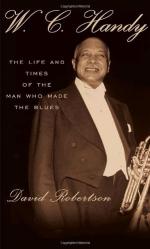|
This section contains 7,791 words (approx. 26 pages at 300 words per page) |

|
SOURCE: “From Jazz Syncopation to Blues Elegy: Faulkner's Development of Black Characterization,” in Faulkner and Race, edited by Doreen Fowler and Ann J. Abadie, University Press of Mississippi, 1987, pp. 70-92.
In the following essay, Davis investigates the influence of Handy's music on William Faulkner's characterization of blacks in his novels.
Listening to W. C. Handy's 1916 blues song “Ole Miss,” recorded by jazz pianist James P. Johnson in 1922, I am reminded of the way in which blues and jazz intermingled in the music of that period. Southern-born Handy, called “the father of the blues,” and Northern-born Johnson, father of the hot piano, did not single-handedly invent the music that they composed and performed; instead, for creative inspiration, each drew upon traditional black music, secular and sacred, during a time when, following Scott Joplin's successful ragtime compositions at the turn of the century, black American musicians laid claim to all...
|
This section contains 7,791 words (approx. 26 pages at 300 words per page) |

|


